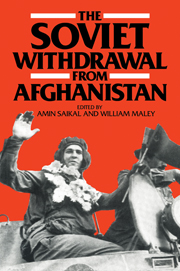Book contents
- Frontmatter
- Contents
- Preface
- 1 Introduction
- 2 The Geneva Accords of April 1988
- 3 Post-Withdrawal Afghanistan: Light at the End of the Tunnel
- 4 The Regional Politics of the Afghan Crisis
- 5 The Afghan Conflict and Soviet Domestic Politics
- 6 The Soviet Armed Forces and the Afghan War
- 7 Afghanistan and Soviet Alliances
- 8 Afghanistan and Sino-Soviet Relations
- 9 The Afghanistan 'Settlement' and the Future of World Politics
- 10 Conclusions: Management of the Afghan Crisis
- List of Contributors
- Index
4 - The Regional Politics of the Afghan Crisis
Published online by Cambridge University Press: 09 November 2009
- Frontmatter
- Contents
- Preface
- 1 Introduction
- 2 The Geneva Accords of April 1988
- 3 Post-Withdrawal Afghanistan: Light at the End of the Tunnel
- 4 The Regional Politics of the Afghan Crisis
- 5 The Afghan Conflict and Soviet Domestic Politics
- 6 The Soviet Armed Forces and the Afghan War
- 7 Afghanistan and Soviet Alliances
- 8 Afghanistan and Sino-Soviet Relations
- 9 The Afghanistan 'Settlement' and the Future of World Politics
- 10 Conclusions: Management of the Afghan Crisis
- List of Contributors
- Index
Summary
The Soviet invasion of Afghanistan produced a crisis not simply for the Afghan people, but for the regions of South and South-West Asia as well. It confronted the main regional actors—Pakistan, Iran and India—with a new political-strategic situation, to which they reacted in distinctive ways. This situation is now set to change once again with the Soviet withdrawal. This chapter has two objectives. The first is to delineate the factors which shaped the responses of regional states to the Soviet invasion. The second is to assess the likely implications of Soviet withdrawal for the individual regional states in the light of these responses.
The Soviet invasion marked an unparalleled development in Soviet international behaviour outside the Warsaw Pact since World War II. To much of the world it signalled a dramatic and dangerous change in the Soviet approach to resolving international problems. It could be read by all those regional and international forces which had traditionally suspected an inherent expansionist tendency in Soviet foreign policy as concrete proof that their suspicions were well-founded. It shocked the West, especially the United States, which felt that it had been cheated despite the sustained efforts of the Carter Administration to maintain a policy of détente with the USSR. It alarmed China, which perceived the Soviet action to be part of an elaborate plan to encircle that country, particularly in the light of the Soviet backed Vietnamese invasion of Kampuchea a year earlier. It perturbed much of the Third World, most importantly many of its Muslim member states, which saw the Soviet action among other things as an atheist assault on their wider religious interests.
- Type
- Chapter
- Information
- The Soviet Withdrawal from Afghanistan , pp. 52 - 66Publisher: Cambridge University PressPrint publication year: 1989



